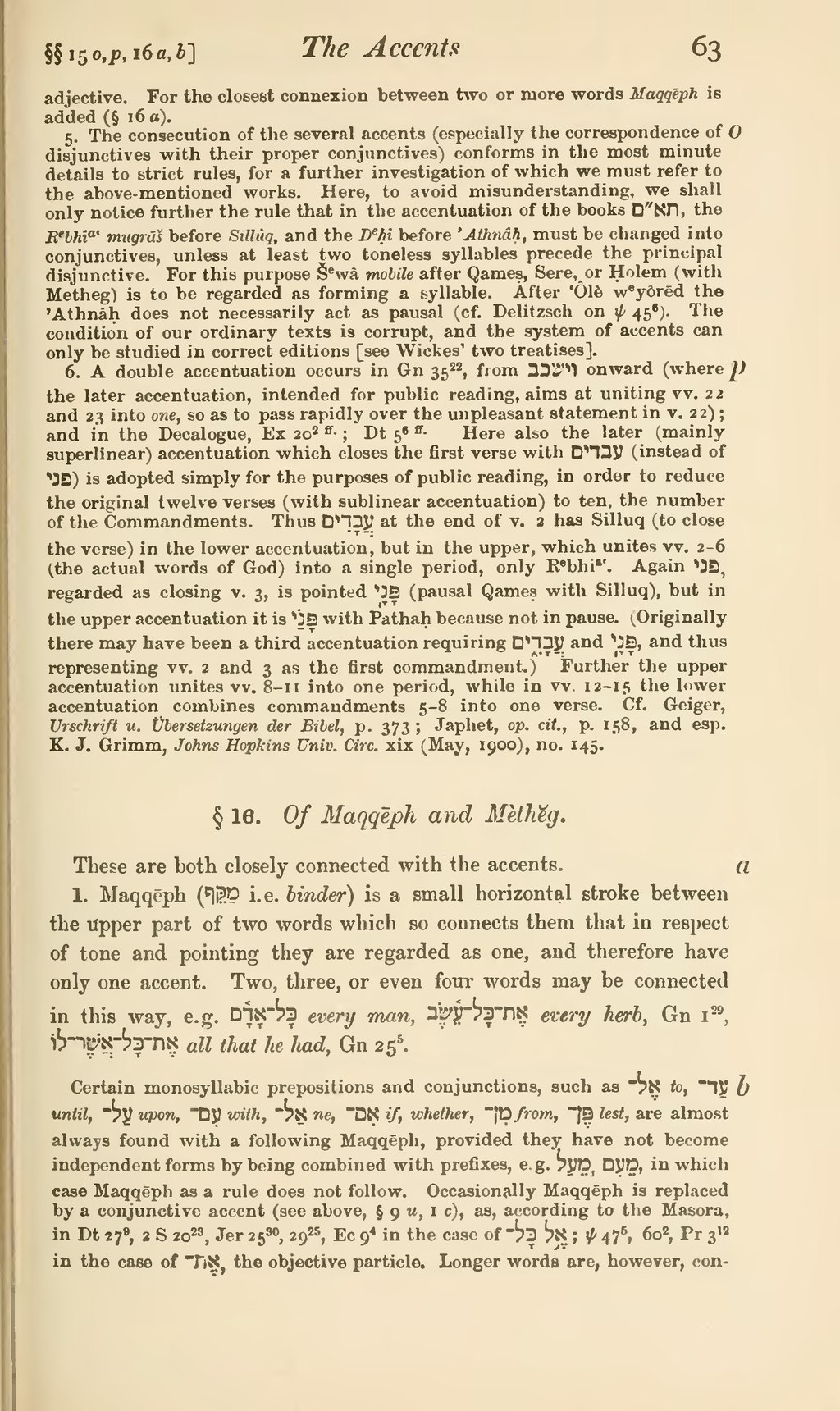This page was corrected according to Additions and Corrections that appear in the 1910 edition.
adjective. For the closest connexion between two or more words Maqqēph is added (§ 16 a).
[o] 5. The consecution of the several accents (especially the correspondence of disjunctives with their proper conjunctives) conforms in the most minute details to strict rules, for a further investigation of which we must refer to the above-mentioned works. Here, to avoid misunderstanding, we shall only notice further the rule that in the accentuation of the books תא״ם, the Rebhiaʿ mugrāš before Sillûq, and the Deḥi before ʾAthnâḥ, must be changed into conjunctives, unless at least two toneless syllables precede the principal disjunctive. For this purpose Šewâ mobile after Qameṣ, Ṣere, or Ḥolem (with Metheg[1]) is to be regarded as forming a syllable. After ʿOlè weyôrēd the ʾAthnâḥ does not necessarily act as pausal (cf. Delitzsch on ψ 45). The condition of our ordinary texts is corrupt, and the system of accents can only be studied in correct editions [see Wickes' two treatises].
[p] 6. A double accentuation occurs in Gn 35, from וישכב onward (where the later accentuation, intended for public reading, aims at uniting vv. 22 and 23 into one, so as to pass rapidly over the unpleasant statement in v. 22); and in the Decalogue, Ex 20; Dt 5. Here also the later (mainly superlinear) accentuation which closes the first verse with עבדים (instead of פני) is adopted simply for the purposes of public reading, in order to reduce the original twelve verses (with sublinear accentuation) to ten, the number of the Commandments. Thus עֲבָדִים at the end of v. 2 has Silluq[2] (to close the verse) in the lower accentuation, but in the upper, which unites vv. 2-6 (the actual words of God) into a single period, only Rebhiaʿ. Again פני, regarded as closing v. 3, is pointed פָּנָֽי (pausal Qameṣ with Silluq[3]), but in the upper accentuation it is פָּנַ֗י with Pathaḥ because not in pause. (Originally there may have been a third accentuation requiring עֲבָדִ֑ים and פָּנָֽי, and thus representing vv. 2 and 3 as the first commandment.) Further the upper accentuation unites vv. 8-11 into one period, while in vv. 12-15 the lower accentuation combines commandments 5-8 into one verse. Cf. Geiger, Urschrift u. Übersetsungen der Bibel, p. 373 ; Japhet, op. cit., p. 158, and esp. K. J. Grimm, Johns Hopkins Univ. Circ. xix (May, 1900), no. 145. [See also Wickes, Prose Accentuation, 130 f., 87 n. (who, however, regards the superlinear, Babylonian system as the earlier); and Ginsburg, Introduction to the Hebrew Bible, 76, 78. In Ginsburg’s Hebrew Bible, ed. 2 (1908), pp. 108 f., 267 f., the two systems of division are printed in extenso, in parallel columns—the 10 verses of the superlinear (Babylonian) system consisting (in Exodus) of v. (as numbered in ordinary texts), and the 12 verses of the sublinear (Palestinian) system, consisting of v..—S. R. D.]
[a] These are both closely connected with the accents.
1. Maqqēph (מַקֵּף i.e. binder) is a small horizontal stroke between the upper part of two words which so connects them that in respect of tone and pointing they are regarded as one, and therefore have only one accent. Two, three, or even four words may be connected in this way, e.g. כָּל־אָדָ֫ם every man, אֶת־כָּל־עֵ֫שֶׂב every herb, Gn 1, אֶת־כָּל־אֲשֶׁר־לוֹ all that he had, Gn 25.
[b] Certain monosyllabic prepositions and conjunctions, such as אֶל־ to, עַד־ until, עַל־ upon, עִם־ with, אַל־ ne, אִם־ if, whether, מִן־ from, פֶּן־ lest, are almost always found with a following Maqqēph, provided they have not become independent forms by being combined with prefixes, e.g. מֵעַל, מֵעִם, in which case Maqqēph as a rule does not follow. Occasionally Maqqēph is replaced by a conjunctive accent (see above, § 9 u, 1 c), as, according to the Masora, in Dt 27, 2 S 20, Jer 25, 29, Ec 9 in the case of אֶ֥ל כָּל־; ψ 47, 60, Pr 3 in the case of אֶת־ the objective particle. Longer words are, however, con-

